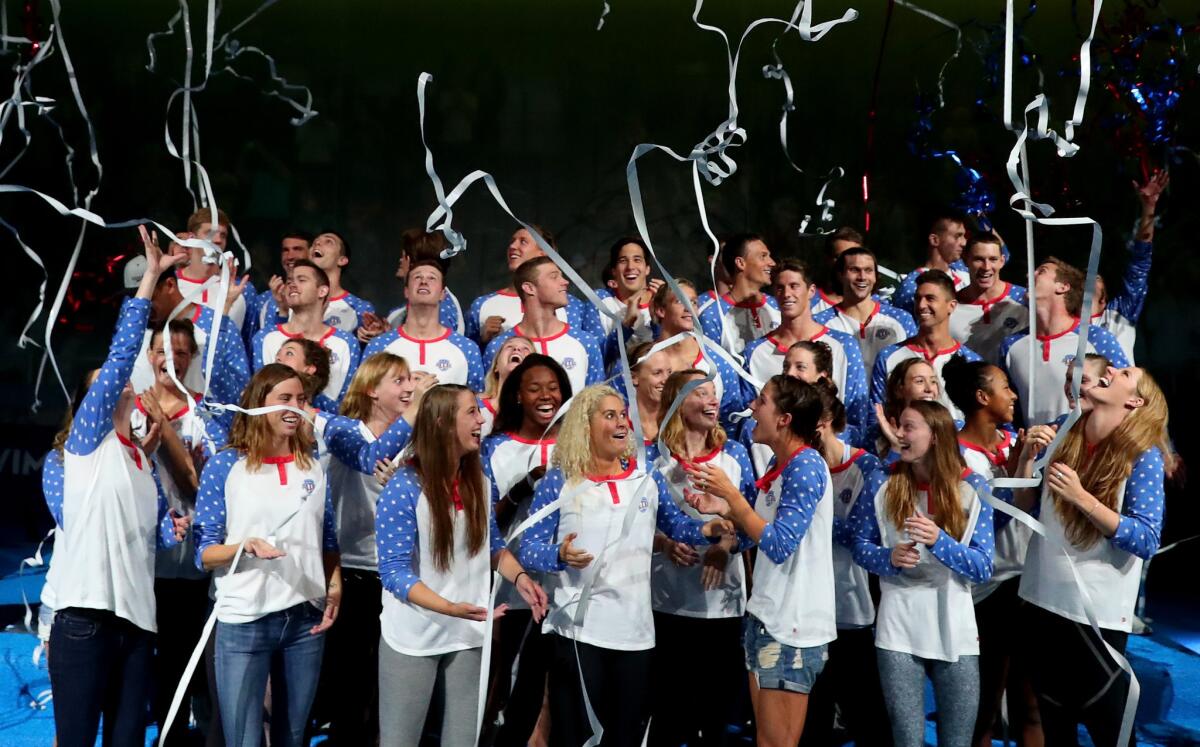After a slow-speed chase at U.S. Olympic swim trials, Michael Phelps, Missy Franklin and others must pick it up before Rio

Reporting from Omaha — The question lingered as colored spotlights swirled around CenturyLink Center, cannons blasted red, white and blue streamers into the air and a troupe from Cirque du Soleil performed at the conclusion of the U.S. Olympic swimming trials Sunday.
For all of the dramatics during the eight-day spectacle — nail-biting finishes, little-known swimmers introducing themselves to the country and plenty of tears — no world records were broken. Veterans like Michael Phelps and Missy Franklin didn’t approach their best times. In fact, 10 of the 26 winning swims were slower than those at the 2012 trials.
How will all of this translate to next month’s Rio de Janeiro Olympics?
“One of the things that we have always done better than anyone else is improved from the trials to the Games and I’m confident we’re going to do that again,” said Bob Bowman, head coach for the U.S. men. “We have a great plan in place to do that and, quite frankly, we’re going to have to do that if we want to have the kind of Olympics that we are expected to have and want to have.”
The U.S. dominated the pool at the London Olympics with 31 medals — including 16 gold. Faster times will be needed to duplicate the performance in Rio.
The only American men who rank first in the world in their events this year are David Plummer (100-meter backstroke) and Josh Prenot (200 breaststroke), both marks set at the trials.
Katie Ledecky owns the world’s best times this year in the 200, 400 and 800 freestyles among the women — she challenged world records in the last two races during the trials — and remains the youngest member of the team at 19. Lilly King recorded the world’s top mark in the 100 breaststroke during the trials. Beyond those two swimmers, U.S. women rank fourth or worse in seven events.
“I think there’s some real strengths and there are some, I would say, significant challenges event-by-event,” said David Marsh, head coach for the U.S. women.
He added: “If you look at the numbers, we’re very good at taking people who swim a good trials or even a poor trials and getting them to swim faster four weeks later.”
Ledecky, the defending Olympic champion in the 800 freestyle and holder of three world records, may be the world’s most dominant swimmer of either gender. Uncertainty lurks beyond her among the 47 swimmers on the combined roster that includes 30 first-time Olympians, two more than the London Games.
Maya DiRado won three events at the trials to make the Olympics for the first time — the 23-year-old plans to retire from swimming following the Games. Can she find similar success in Rio?
After winning four gold medals at London, Missy Franklin didn’t qualify to defend her 100 backstroke title. Franklin, still just 21, managed second-place finishes in the 200 backstroke and 200 freestyle at the trials. Will she be able to rediscover some of the old dominance?
“I think I thickened up my armor quite a bit this week, so moving forward [I’m] very proud of that and excited to see where that toughness can lead me,” Franklin said.
She wasn’t the only defending Olympic champion to struggle at the trials. Tyler Clary and Matt Grevers, both individual gold-medal winners in London, didn’t make the team. Ryan Lochte swam his way onto the roster, but, hampered by an injured groin, didn’t qualify to defend his title in the 400 individual medley.
In the final races of the trials Sunday, Santa Clarita’s Abbey Weitzeil won the 50 freestyle — she captured the 100 freestyle a night earlier — and Connor Jaeger recorded the world’s fourth-best time this year in winning the 1500 freestyle. Malibu’s Jordan Wilimovsky finished second. He’s the first American to qualify for both the pool and open water competitions at the same Olympics.
Phelps, the most decorated Olympian of all time with 22 medals including 18 gold, won three events at the trials to qualify for his fifth — and final — Olympics. But there’s plenty of room for improvement.
“I know if I want to be anywhere on the podium, some of those times are going to have to be a lot faster,” he said.
Phelps, whose times didn’t reflect the speed he showed last year, wasn’t shy in criticizing his performance despite the wins in the 100 and 200 butterfly and 200 IM. Neither was Bowman, his longtime coach. They have a plan to address the issues over the next four weeks.
“I thought his times this week were mediocre,” Bowman said, “and I am crystal clear on what I need to do.”
The coach didn’t elaborate.
Bowman, however, did surmise that the slow times at the trials could be related to the atmosphere that swimmers believe is packed with more pressure and carries more competition than the Olympics.
“I think it makes them quite frankly more nervous when they come in because it’s a much bigger stage,” he said. “It’s not like a swim meet. It’s more than that.”
Twitter: @nathanfenno
More to Read
Go beyond the scoreboard
Get the latest on L.A.'s teams in the daily Sports Report newsletter.
You may occasionally receive promotional content from the Los Angeles Times.











